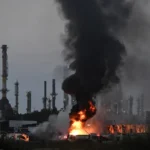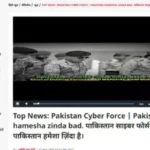The Middle East stands today on the edge of a dangerous precipice. The rapidly escalating conflict between Iran and Israel is no longer a regional flashpoint — it has the makings of a global crisis. From missile strikes to nuclear facility attacks, both sides are locked in a deadly standoff that threatens not just regional peace, but global stability.
🚀 Israel Strikes First, Iran Strikes Back — And the Game Changes
Israel launched a series of calculated and widespread attacks targeting Iran’s nuclear facilities, military installations, and even residential zones. In response, Iran fired missiles at key Israeli cities including Tel Aviv and Herzliya. The Iranian Revolutionary Guard (IRGC) claimed a successful strike on a Mossad intelligence center — a move that sent shockwaves across global security circles.
This was no ordinary retaliation. It was a message.
🌐 Global Reactions — A Divided World
The United States adopted a hardline stance, calling not for a temporary ceasefire but a lasting resolution. The G7 urged Iran to avoid nuclear weapon development while backing Israel’s “right to defense.”
Meanwhile, China and Russia strongly condemned Israel’s aggression and offered to mediate — a proposal Israel promptly rejected.
Muslim-majority nations such as Qatar, Turkey, and Pakistan issued strong condemnations of Israel’s actions. Pakistan’s official statement warned that Israel’s behavior was fueling war in an already volatile region and posed a threat to global peace.
☢️ The Nuclear Danger — A Crisis in the Making
The most alarming dimension of this conflict is the attack on nuclear infrastructure. Israel’s strike on Iran’s Natanz nuclear site has reportedly caused severe damage to uranium enrichment facilities, according to the International Atomic Energy Agency (IAEA).
Iran is a signatory to the Nuclear Non-Proliferation Treaty (NPT). Israel, however, is not — and is widely believed to possess around 90 nuclear warheads. This imbalance is unsettling for the global community and raises the grim specter of nuclear war.
🧍♂️ The Human Cost — Civilians Always Pay the Price
Beyond the military maneuvers, there is a deepening humanitarian crisis. Civilian infrastructure — hospitals, schools, homes — has been damaged. Dozens have died on both sides, and over 600 foreign nationals have been evacuated from Iran, a stark signal that the situation remains highly unstable.
What’s unfolding isn’t just a military conflict — it’s a human tragedy.
⚔️ Iran’s Message — This Is More Than Just War
Iran’s response wasn’t just about missiles — it was about memory, dignity, and resistance. For years, the Muslim world watched as Palestinian children died under airstrikes, Gaza’s hospitals were turned to rubble, and international organizations failed to act.
Iran’s action, however controversial, was a defiant voice in the silence.
For the first time, Israel, the seemingly invincible military powerhouse backed by the West, looked afraid. The nation that once rained bombs on Gaza now rushed to shield its own homes.
Iran’s retaliation wasn’t about political gain. It was the echo of generations of prayers, tears, and unanswered cries.
🕌 A Wake-Up Call for the Muslim World?
This moment raises a profound question: Will other Muslim nations rise from their diplomatic slumber? Condemnations and statements are no longer enough. The time for symbolic gestures is over.
Iran didn’t just respond militarily — it sparked a psychological and spiritual awakening.
🕊️ This Is Not Just War — It’s a Turning Point in History
The current standoff is not just a war of missiles; it is a war of ideologies, of courage, and of conscience. Iran has sent a bold message: “Oppression can be answered. Fear can change sides.”
In the eyes of the oppressed — the children of Gaza, the mothers of Palestine — a flicker of hope now shines. For the first time in a long while, someone stood up and said, “You are not alone.”
💭 Final Thoughts — The Road Ahead
The world now faces a choice: Diplomacy or disaster. Unity or escalation. This is not merely about Iran and Israel anymore — it’s about what kind of world we want to live in.
If the international community does not act swiftly, what we’re witnessing could very well spiral into a global catastrophe.
But if Muslim nations unite, if global powers rise above bias, if the world truly values peace — then perhaps this moment of crisis can become a turning point.














